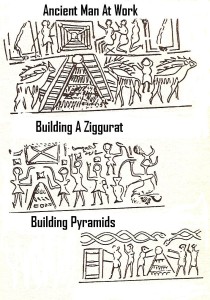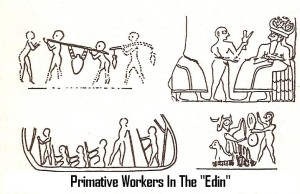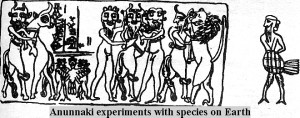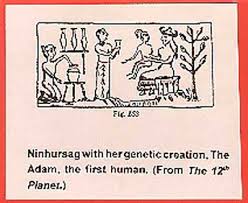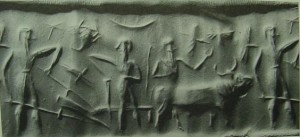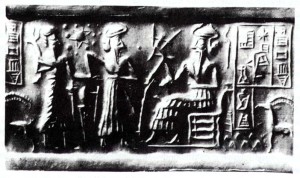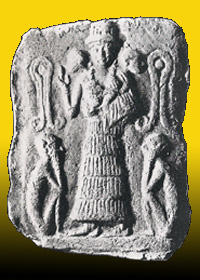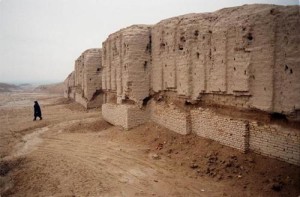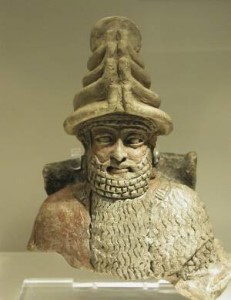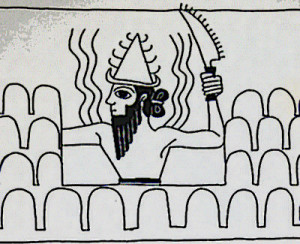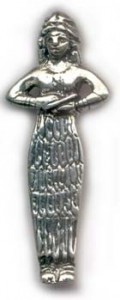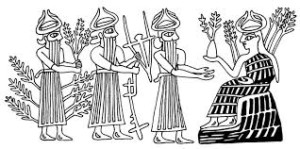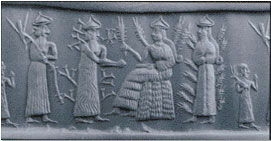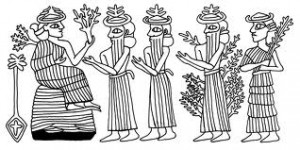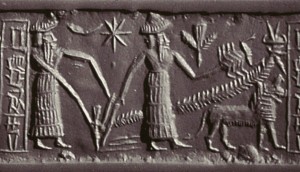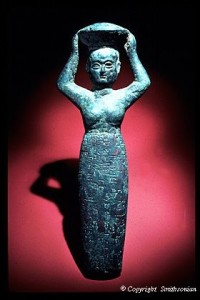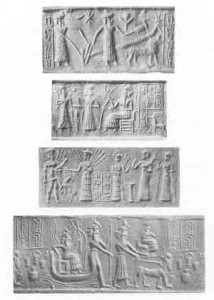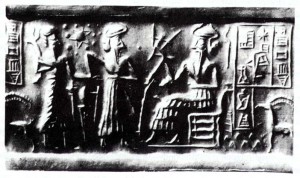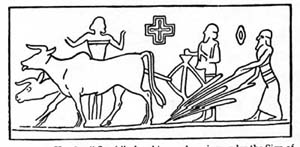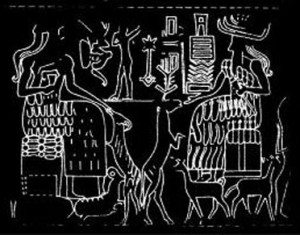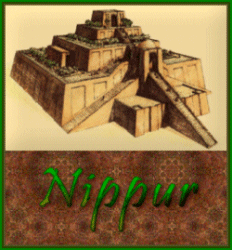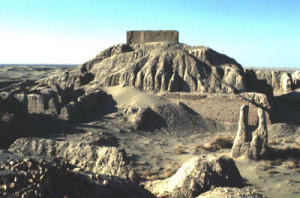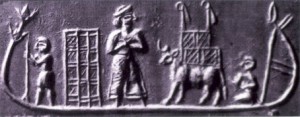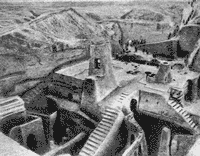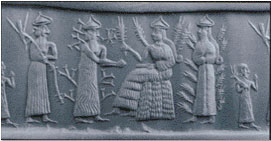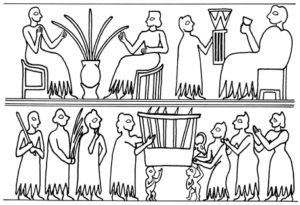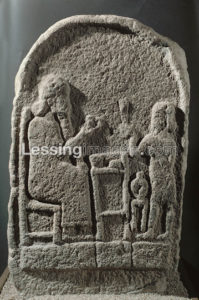The Electronic Text Corpus of Sumerian Literature
(Texts: All Artifacts, Color Coding, & Writings in Bold Type With Italics Inside Parenthesis, are Added by Editor R. Brown, not the Authors, Translators, or Publishers!)
(gods in blue …mixed-breed demigods in teal…)
(Ninhursag‘s creature creation = Enkidu)
In this composition, the word al ‘hoe’ is used as often as possible, as well as many nouns or verb forms beginning with — or merely containing — the syllable al (occasionally also ar).
1-7 Not only did the lord make the world appear in its correct form —
the lord who never changes the destinies which he determines:
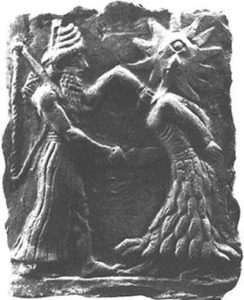 (Enlil, son & heir to Anunnaki King Anu, his father’s Earth Colony Commander, his decisions are final)
(Enlil, son & heir to Anunnaki King Anu, his father’s Earth Colony Commander, his decisions are final)
Enlil, who will make the human seed of the Land come forth
(3 mss. have instead: up) from the earth (2 other mss. have instead: chamber) —
and not only did he hasten to separate heaven from earth, and hasten to separate earth from heaven,
but, in order to make it possible for humans to grow in ‘Where Flesh Came Forth’
(2 mss. have instead: ‘Where Flesh Grew’) [the name of a cosmic location],
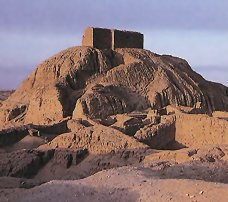 (Enlil‘s residence & Earth Colony Command Center in his city of Nippur)
(Enlil‘s residence & Earth Colony Command Center in his city of Nippur)
he first suspended (2 mss. have instead: raised) the axis of the world at Dur-an-ki (“Bond Heaven and Earth”).
8-17 He did this with the help of the hoe (al) — and so daylight broke forth (aled).
By distributing (altare) the shares of duty he established daily tasks,
and for the hoe (al) and the carrying-basket wages were even established.
Then Enlil praised his hoe (al), his hoe (al) wrought in gold,
its top inlaid with lapis lazuli (blue-hued gem stone), his hoe (al) whose blade was tied on with a cord,
which was adorned with silver and gold, his hoe (al), the edge of whose point (?) was a plow of lapis lazuli,
whose blade was like a battering ram standing up to a great (gal) wall
(1 ms. has instead: born for a great (gal) person (?)).
The lord evaluated the hoe (al), determined its future destiny and placed a holy crown on its head …….
18-27 Here, in ‘Where Flesh Came Forth’ (1 ms. has instead: ‘Where Flesh Grew’)
[the name of a cosmic location], he set this very hoe (al) to work;
(1 other ms. has instead: in ‘Where Flesh Grew’ the unassailable (?),)
he had it place the first model of mankind in the brick mold (aliens cloning workers, DNA technologies).
His Land started to break through the soil towards Enlil.
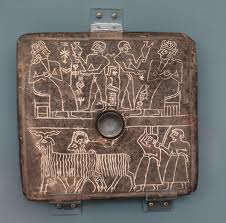 (Enlil & Enki served by earthling primitives, “modern man”)
(Enlil & Enki served by earthling primitives, “modern man”)
He looked with favor at his black-headed people.
Now the Anuna gods stepped forward to him, and did (jal) obeisance to him.
They calmed Enlil with a prayer, for they wanted to demand (al-dug) the black-headed people (workers) from him.
(Ninhursag, Enki, & Ningishzidda worked the DNA mixing of alien giants with upright walking primitives, SEE ADAPA TEXTS)
Ninmena (Ninhursag), the lady who had given birth to the ruler,
(“modern man” fashioned by alien giants, to replace Anunnaki workers from their heavy burdens, Anunnaki leader Enlil demanded workers for Eden from Enki‘s group in the mines of SO Africa, creating problems between the Anunnaki)
who had given birth to the king, now set (aljaja) human reproduction going.
28-34 The leader of heaven and earth, lord Nunamnir (Enlil),
named the important persons and valued (kal) persons.
He …… these persons, and recruited them to provide for the gods (in Eden).
Now Enki praised Enlil‘s hoe (al), and the maiden Nisaba (Enlil‘s mother-in-law) was made responsible
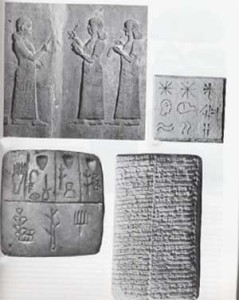 (Nisaba, alien Anunnaki Master Scribe, Goddess of Grains, many of her records discovered)
(Nisaba, alien Anunnaki Master Scribe, Goddess of Grains, many of her records discovered)
for keeping records of the decisions.
And so people took (jal) the shining hoes (al), the holy hoes (al), into their hands.
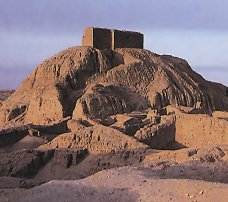 (mud brick-built mountain / temple / residence of Enlil & Ninlil, city of Nippur below)
(mud brick-built mountain / temple / residence of Enlil & Ninlil, city of Nippur below)
35-42 The E-kur, the temple of Enlil, was founded by the hoe (al).
By day it was building (aldue) it, by night it caused the temple to grow (almumu).
(earthling mixed-breed shepherd, Ninurta, & Enlil handing earthlings the burden of the plow, our solar system in background)
In well-founded Nibru, the hero Ninurta entered into the presence of Enlil
in the inner chamber of the Tummal –the Tummal, the bread basket (?)
(1 ms. has instead: …… masterpiece (?)) of mother Ninlil —
the innermost chamber of the Tummal, with regular food deliveries.
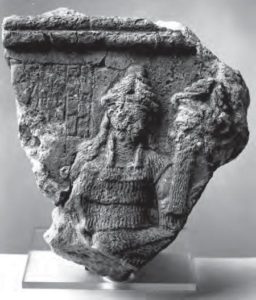 (Bau & her nephew-spouse Ninurta, Enlil‘s son & heir)
(Bau & her nephew-spouse Ninurta, Enlil‘s son & heir)
Holy Ninisina (Bau / Gula) entered into the presence of Enlil with black kids and fruit offerings for the lord.
43-45 Next comes the Abzu, with the lions before it,
where the divine powers (alien technologies) may not be requested (al-dug): the hoe wielder (?) (altar), the good man,
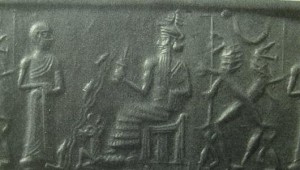
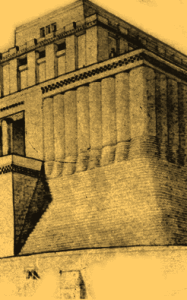
(1st “modern man” the “mold” to start the new species of advanced earthlings, Enki, the DNA Master; Enki‘s house in Eridu)
lord Nudimmud (Enki) was building (aldue) the Abzu, Eridug having been chosen as the construction site (altar).
(Ninhursag‘s early failed attempts to fashion workers for the alien Anunnaki gods; her city walls of Kish)
46-48 The mother of the gods, Ninhursaja (Ninhursag),
had the mighty (?) (altar) light of the lord live with her in Kec (Kish);
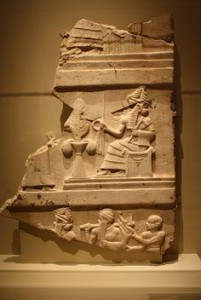 (Enlil seated, below Ninurta leads mixed-breed king & workers to alien ziggurat construction site)
(Enlil seated, below Ninurta leads mixed-breed king & workers to alien ziggurat construction site)
she had Cul-pa-eda (Ninurta), no less, help her with the construction work (altar).
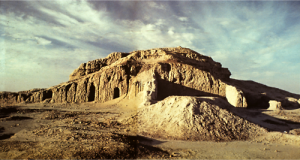 (Anu‘s, Inanna‘s, Ninsun‘s, etc. residence in Uruk)
(Anu‘s, Inanna‘s, Ninsun‘s, etc. residence in Uruk)
49-51 The shrine E-ana (Anu‘s temple – residence in Uruk)
was cleaned up by means of the hoe (al) for the lady of E-ana, the good cow (immal) (2 mss. have instead: woman).
The hoe (al) deals with ruin mounds, the hoe (al) deals with weeds.
52-55 In the city of Zabalam (city loyal to Inanna), the hoe (al) is Inanna‘s workman (?).
She determined the destiny of the hoe (al), with its projecting lapis-lazuli beard (1 ms. has instead: tooth).
(Utu, grandson to Enlil, the Space Port Commander in Sippur; launch & landing zones cut into the mountains by Utu)
Utu was ready to help her with her building project (altar);
it is the renowned (?) building project (altar) of youthful Utu.
(Nisaba, spouse to Haia, Ninlil‘s mother, Master Anunnaki Scribe, Goddess of Grains, hoe & plow)
56-58 The lady with broad (dajal) intelligence, Nisaba,
ordered the measuring of the E-ana for a construction project (altar),
and then designed her own E-hamun (in Uruk) for construction (altar).
59-70 The king who measured up the hoe (al) and who passes (zal) his time in its tracks,
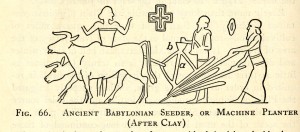 (planet Nibiru‘s cross symbol in the sky)
(planet Nibiru‘s cross symbol in the sky)
the hero Ninurta, has introduced working with the hoe (altar) into the rebel (bal) lands.
He subdues (aljaja) any city that does not obey its lord.
Towards heaven he roars (algigi) like a storm, earthwards he strikes (aljaja) like a dragon (ucumgal).
Cara (Shara, Inanna‘s son, Roman god Cupid) sat down on (1 ms. has instead: got onto) Enlil‘s knees,
and Enlil gave him what he had desired (al-dug):
he had mentioned the mace, the club, arrows and quiver, and the hoe (al)
(3 mss. have instead: he desired (al-dug) the mace, the club, arrows and quiver).
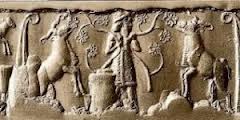 (Dumuzi The Shepherd, Enki‘s & Ninsun‘s son, young Inanna‘s spouse)
(Dumuzi The Shepherd, Enki‘s & Ninsun‘s son, young Inanna‘s spouse)
Dumuzid (Dumuzi) is the one who makes the upper land fertile (allumlum).
Gibil (god of the fiery kilns, metal fashioner) made his hoe (al) raise its head towards the heavens —
he (Enki‘s son of metallurgy) caused the hoe (al), sacred indeed, to be refined with fire.
The Anuna (Anunnaki) were rejoicing (alhulhuledec).
71-82 The temple of Jectin-ana (Geshtinanna, Enki‘s daughter) resembled an aljarsur instrument,
the aljarsur of mother Jectin-ana (goddess of songs) that makes a pleasant sound.
(Enlil Haia Nisaba Ninlil unidentified)
The lord [Enlil] bellowed at his hoe (al) like a bull.
As for the grave (irigal): the hoe (al) buries people,
but dead people are also brought up from the ground by the hoe (al)
[This may allude to Enkidu‘s ghost being put in contact with Gilgamec.].
With the hoe (al), the hero honored by An (Anu), the younger brother (the grandfather) of Nergal,
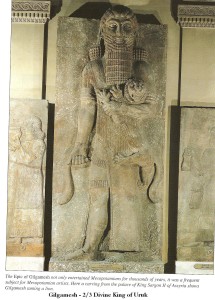 (giant Gilgamesh, son to Ninsun & Lugalbanda, 2/3rds divine, 5th king of Uruk)
(giant Gilgamesh, son to Ninsun & Lugalbanda, 2/3rds divine, 5th king of Uruk)
the warrior Gilgamec is as powerful as a hunting net.
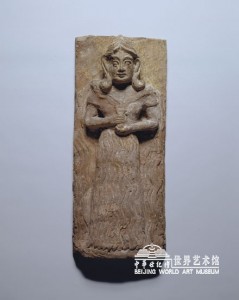 (Ninsun, daughter to Ninurta & Bau, mother to gods & many earthling mixed-breeds made kings)
(Ninsun, daughter to Ninurta & Bau, mother to gods & many earthling mixed-breeds made kings)
The (1 ms. adds: sage) son of Ninsumun (Ninsun) is pre-eminent with oars (jisal)
[This may allude to Gilgamec rowing across the waters of death.].
With the hoe (al) he is the great barber (kindajal) of the watercourses.
In the chamber (1 ms. has instead: place) of the shrine, with the hoe (al) he is the minister (sukkal).
The wicked (huljal) …… are sons of the hoe (al); they are born in sleep from heaven.
83-93 In the sky there is the altirigu bird, the bird of the god.
On the earth there is the hoe (al): a dog in the reed-beds, a dragon (ucumgal) in the forest.
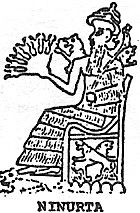 (Ninurta‘s 50-headed mace, alien Anunnaki advanced technologies of weaponry)
(Ninurta‘s 50-headed mace, alien Anunnaki advanced technologies of weaponry)
On the battlefield, there is the dur-allub battle-axe.
By the city wall there is the battle-net (alluhab).
On the dining-table there is the bowl (maltum).
In the wagon shed, there is the sledge (mayaltum).
In the donkey stable there is the cupboard (argibil).
The hoe (al)! — the sound of the word is sweet: it also occurs (munjal)
on the hillsides: the tree of the hillsides is the allanum oak.
The fragrance of the hillsides is the arganum balm.
The precious stone of the hillsides is the algamec steatite.
94-106 The hoe (al) makes everything prosper, the hoe makes everything flourish.
The hoe (al) is good barley, the hoe (al) is a hunting net (1 ms. has instead: an overseer).
The hoe (al) is brick molds, the hoe (al) has made people exist (jal).
It is the hoe (al) that is the strength of young manhood.
The hoe (al) and the basket are the tools for building cities.
It builds (aldue) the right kind of house, it cultivates (aljaja) the right kind of fields.
It is you, hoe, that extend (dajal) the good agricultural land!
The hoe (al) subdues for its owner (lugal) any agricultural lands
that have been recalcitrant (bal) against their owner (lugal),
any agricultural lands that have not submitted to their owner (lugal).
It chops the heads off the vile esparto grasses, yanks them out at their roots, and tears at their stalks.
The hoe (al) also subdues (aljaja) the hirin weeds.
107-109 The hoe (al), the implement whose destiny was fixed by father Enlil—the renowned hoe (al)!
(Nisaba 2 gods unidentified spouse Haia daughter Ninlil)
Nisaba (Ninlil‘s mother, Haia‘s spouse, Enlil‘s mother-in-law) be praised!
